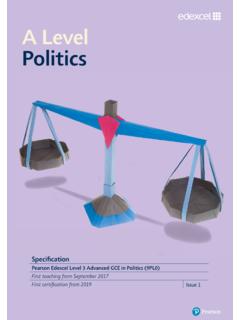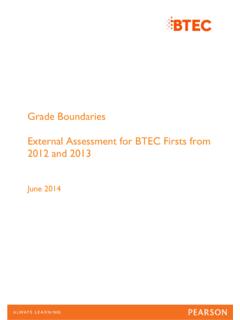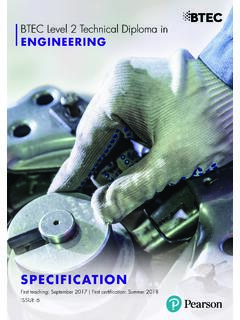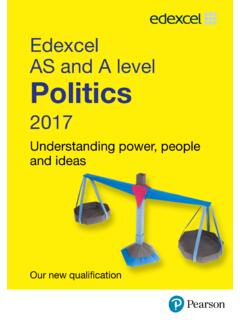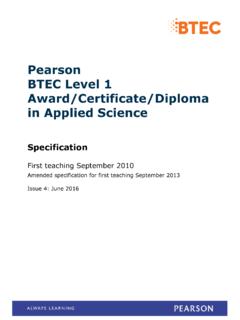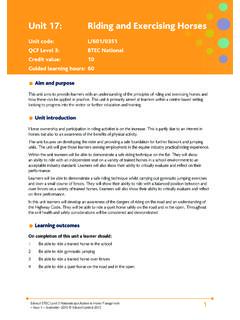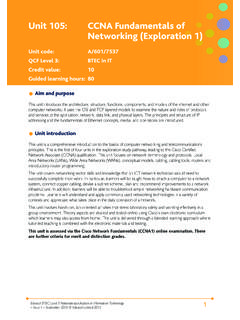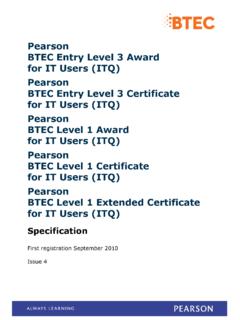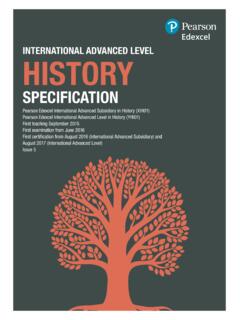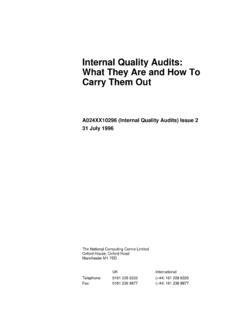Transcription of BTEC Cent re Guide to Internal Assessment 201 8 /1 9
1 BTEC Centre Guide to Internal Assessment 2018/19. Prepared by: Claire Jenkins / Authorised by: Blayne Cooper / Version - June 2018 / DCL1 Public Introduction Welcome to BTEC and we hope you enjoy teaching the qualification This Guide provides essential guidance for BTEC programme teams on the planning and implementation of the Internal Assessment of BTEC. qualifications. As the majority of BTEC units are internally assessed you can tailor the Assessment criteria to suit your learners and/or local employers. Internal Assessment should be fair and consistent as defined by the requirements for national standards. Which qualifications does this Guide cover? This Guide covers BTEC qualifications from Entry Level to Level 3.
2 This includes: BTEC 2010 Firsts and Nationals (Legacy). 2012 Firsts 2016/17 Nationals 2016 Introductory Suite Tech Awards L2 Technicals It does not cover: BTEC Qualifications accredited by SQA. For guidance on BTEC Security (SQA). qualifications please refer to the BTEC Security Centre Management Handbook. BTEC Entry Level programmes BTEC Level 1 programmes BTEC Specialist programmes from Entry to Level 3. BTEC Workskills. 2 . Prepared by: Claire Jenkins / Authorised by: Blayne Cooper / Version - June 2018 / DCL1 Public Planning Making time for planning is the best way of ensuring everything is in place for robust and achievable Assessment . Assessment Plans A BTEC qualification is comprised of individual units that cover specific topics.
3 Both a unit-by- unit approach and an integrated approach to delivery are valid and appropriate methods. However, what should be avoided is the splitting of Learning Aims/Learning Objectives across assignments and/or the provision for extra assignments or tasks to meet the Merit or Distinction criteria. Tasks are expected to be written to allow opportunities for the full achievement of Pass, Merit and Distinction criteria. If deciding to deliver through an integrated approach, it is important, to map the Assessment of evidence against unit criteria across units and maintain accurate records of learner achievement. It is also important to consider the published guidance in the unit specification as = for each unit so that a coherent programme of study can be ensured.
4 For example, core units often provide a foundation of knowledge for other units. The Assessment plan is a working document. As a minimum requirement, the Assessment plan should include: names of all Assessors and Internal Verifiers scheduling for assignment hand out and submission deadlines for assessments scheduling for Internal verification and the opportunity for resubmission For programmes where units are successfully integrated, a suitable Assessment plan should provide the appropriate Assessment criteria. Robust Assessment plans should be developed jointly by the programme team and verified by the Lead Internal Verifier. Suggested key areas of focus when planning for Assessment are: unit sequencing or integration assignments and projects resource planning, such as when to deploy specialist staff timetabling, events, shows and trips schemes of work 3.
5 Prepared by: Claire Jenkins / Authorised by: Blayne Cooper / Version - June 2018 / DCL1 Public external resources planning assignment deadlines across the programme to ensure a continually balanced workload for learners feedback from learners and from external sources, such as progression providers ensuring authenticity of learner work Planning Internal verification Internal verification represents a quality assurance approach used to monitor Assessment practices and decisions to ensure that: Assessment instruments are fit for purpose Assessment decisions accurately match learner evidence to the unit Assessment criteria and Assessment guidance Assessors are standardised and Assessment and grading is consistent across the programme.
6 The Internal verification process should be established before the programme commences. There is not a requirement that all learners are internally verified during the lifetime of a programme. Full guidance on Internal verification can be found in the BTEC Centre Guide to Internal Verification on the Prepare for September page, here. myBTEC. myBTEC is designed to support the team delivering and assessing BTEC, so the entire team can get access, whatever their department or role. It is designed to save you time by automatically generating the documents you need for Assessment Further information and guidance on how to use myBTEC can be found at: Conflict of interest Assessment staff may encounter a potential conflict of interest in their work.
7 Examples of these may include: a close relation, spouse or partner within the centre who is either a learner or another member of staff a close relation, spouse or partner acting as a Standards Verifier or other external quality assurance role. 4 . Prepared by: Claire Jenkins / Authorised by: Blayne Cooper / Version - June 2018 / DCL1 Public Individuals should be forthcoming in disclosing any activity that might represent a conflict of interest. A formal up to date log of potential and actual conflicts of interest should be kept within your centre and be made available upon request for Quality Management Review. This should include any actions taken to minimise risks. Assessment and grading The Assessor should decide when the learner is suitably prepared to undertake the Assessment .
8 Once learners are working on assignments which will be submitted for Assessment , it is essential they work independently to produce and prepare evidence for Assessment . Before commencing an Assessment , the Assessor should take care to ensure each learner understands: the Assessment requirements the nature of the evidence they need to produce the importance of time management and meeting deadlines. Assessing Unit Content Professional judgement will always be required but the following principles apply to all BTEC programmes: It is not a requirement that all of the content is assessed unless specifically directed by the Assessment criteria and associated Assessment guidance in the unit specification A centre is expected to deliver ( teach') the unit content fully.
9 You must cover all the elements of content, apart from anything preceded by ' which is merely an example of what you may choose to cover. A learner is not required to provide evidence for all the unit content, but is required to provide sufficient evidence to address the Assessment & grading criteria in order to successfully achieve the unit. 5 . Prepared by: Claire Jenkins / Authorised by: Blayne Cooper / Version - June 2018 / DCL1 Public Submission of evidence Only one submission is allowed for each assignment . The Assessor is expected to formally record the Assessment result and confirm the achievement of specific Assessment criteria. Each learner should submit: evidence towards the targeted Assessment criteria a signed and dated declaration of authenticity with each assignment which confirms they have produced the evidence themselves.
10 The declaration can be on the Assessment record or a separate learner authenticity declaration or an electronic platform or by incorporating a learner declaration into an assignment Brief front sheet. The assessor should then: formally record and confirm the achievement of specific Assessment criteria complete a confirmation that the evidence they have assessed is authentic and is the learner's own work to the best of their knowledge Before your learners start an Assessment , you should: be confident they are sufficiently prepared to undertake Assessment encourage them to aim at getting it right on first submission so they are not relying on a repeat submission or retake where applicable This should help learners develop responsibility for their own achievement and prepare them for the world of work or Higher Education.
